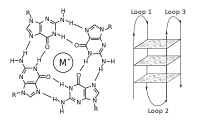
Photo from wikipedia
The base excision repair (BER) pathway is essential for cancer cells to resist chemotherapeutic treatment, but its significance is underrated. The present study describes a novel Pt(IV) prodrug, AP1, targeting… Click to show full abstract
The base excision repair (BER) pathway is essential for cancer cells to resist chemotherapeutic treatment, but its significance is underrated. The present study describes a novel Pt(IV) prodrug, AP1, targeting a critical BER protein, apurinic/apyrimidinic endonuclease 1 (APE1). AP1 induces intracellular accumulation of platinum and activates DNA damage response and apoptosis signals. AP1 can strongly inhibit the growth of malignant cells, including cisplatin-resistant cancer cells, with up to 18.11 times inhibition compared with cisplatin. Moreover, it is as toxic to normal cells as cisplatin. In a xenograft model, AP1 is 3.86-fold more potent than cisplatin without adverse effects. Intriguingly, AP1 can directly inhibit the AP endonuclease activity of APE1, leading to an interruption of miRNA processing and upregulation of the tumor suppressor PTEN. Our findings shed light on a mode of Pt(IV) interaction with a target protein and highlight the critical role of BER in platinum-based cancer treatment.
Journal Title: Journal of medicinal chemistry
Year Published: 2022
Link to full text (if available)
Share on Social Media: Sign Up to like & get
recommendations!